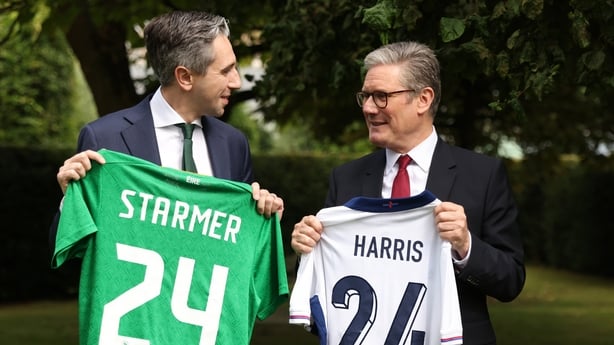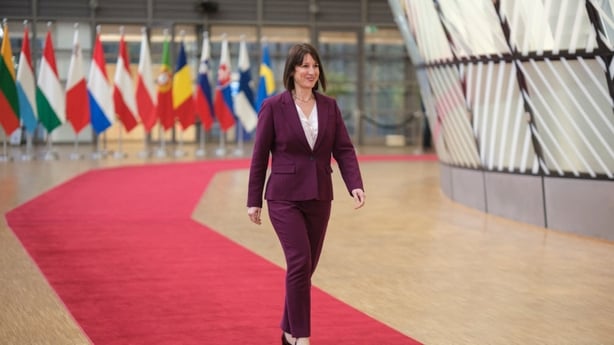On a sunny afternoon in July, just 12 days after entering office, newly installed British Prime Minister Keir Starmer welcomed his first foreign visitor in the shape of Taoiseach Simon Harris.
At the request of both men, they were given time to walk the grounds of the country retreat, Chequers.
They discussed what they wanted the "reset" in Anglo-Irish relations to look like.
Little detail of their conversation was provided afterwards.
The only pledge from Mr Harris was one to establish a new annual summit between both the British and Irish governments, which would allow both sides to commit to and work on shared initiatives.
The first of those summits will take place in the new year, with Fianna Fáil leader Micheál Martin likely to be Taoiseach when it does take place.
Plan for the summit
Officials on both sides are currently trying to find a suitable location for the summit, which is due to take place in March.
At the moment, it seems as though it will likely take place in England, with some suggesting that it could be in Liverpool.
There are a number of areas in which both governments have committed to work as partners.
They include justice, global issues, climate, technology, trade, investment, culture and education.
According to senior sources, renewable energy could be a focus of the event.

Initiatives between Ireland and other countries have been undertaken before, such as the Celtic interconnector project with France.
The offshore wind sector is one which some believe could allow for future collaboration.
Both the UK and Ireland are hoping to significantly ramp up the delivery of housing.
In that context, some officials also believe there could be scope for joint ventures, perhaps in the area of new building methods and research.
While the summit will be attended by both the Taoiseach and Prime Minister, other members of government might also be present, depending on the areas of shared cooperation that will be focused on at the summit.
Britain hoping for a wider UK-EU reset
One of the central aims of the Labour government is to grow the economy.
UK Minister for European Relations Nick Thomas-Symonds has previously stated that he would like to see a new "agri-food" agreement with the European Union, to ease checks on animal and plant products.
Those talks are due to get under way in the new year.
Earlier this month, the UK's Chancellor of the Exchequer, Rachel Reeves, met with EU finance ministers in Brussels.
During a press conference afterwards, she did not rule out "dynamic alignment" with the EU, which would see the UK maintain some rules in order to avoid barriers to trade.

Mr Starmer's government is also looking for a "mutual recognition agreement" for professional qualifications and a reduction in Brexit barriers for British artists seeking to travel around Europe.
In return, Europe wants a youth exchange scheme, which Mr Starmer has previously said he has no plans to introduce. However, many believe there may be space for compromise.
The UK's close relationship with Ireland is seen as beneficial from both a UK and EU perspective.
Ireland is viewed as a good 'soundboard'', according to one senior official, particularly in the context of any new agri-food agreement.
Given that the UK is no longer part of regular EU Council meetings, Ireland's understanding of the UK position is helpful in the context of future negotiations.
Will the new Irish Government change the dynamic?
When the Ireland-UK summit takes place in March, it is likely that a new Irish government will be formed with Mr Martin viewed as most likely to be Taoiseach.
Given that Fianna Fáil and Fine Gael are set to be the main coalition partners again, there is unlikely to be any change in the approach to the UK.
Mr Martin met Mr Starmer as recently as this month at the British-Irish Council.
Mr Martin posted a picture to X, saying that the pair discussed "Northern Ireland including legacy issues, EU-UK relations and the forthcoming Ireland-UK summit".
Warm and constructive meeting with British PM @Keir_Starmer
— Micheál Martin (@MichealMartinTD) December 6, 2024
Welcome the renewed commitment to the British-Irish relationship.
Discussed Northern Ireland including legacy issues, EU-UK relations and the forthcoming Ireland-UK summit. pic.twitter.com/TpwJ8MO83l
It is understood that Mr Starmer also took the opportunity to ask the Fianna Fáil leader about government formation talks in Ireland and the timeline for an agreement.
Ireland still has an active interstate case against the UK, in relation to the controversial Northern Ireland Legacy Act.
Despite Secretary of State for Northern Ireland Hilary Benn committing to repeal and replace the law, Ireland has not begun the process of ending its interstate case.
According to senior officials in the Irish government, the process of withdrawing the case will begin when Ireland is satisfied with what the UK government puts in place to replace the Legacy Act.
"We will be guided by the victims, but we do welcome the progress made," one senior source said.
Asked if that process to end the interstate case could begin in 2025, they said it was too early to say.
The relationship between both Ireland and the UK has already improved significantly following the arrival of the Labour government six months ago.
However, while warm words have been plentiful, next year will see attempts to put "meat on the bone" of that future relationship across a number of areas.







